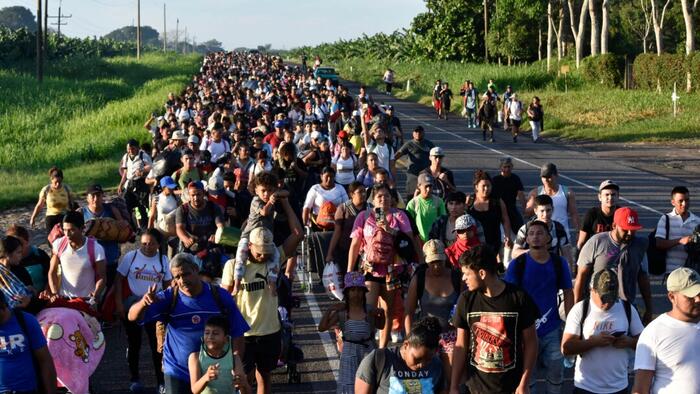In recent discussions regarding the migrant crisis within the United States and other prosperous Western nations, concerns have emerged about the overwhelming influx of migrants that are straining public systems and creating discontent among citizens. This wave of migration has raised crucial questions: Why are multiple nations simultaneously experiencing a surge in migration? What factors led to the breakdown of local border systems, transforming individual migrant issues into a broad global crisis? These issues have sparked a need to scrutinize the reasons behind this sudden shift into a global problem, especially in the backdrop of previous globalized responses to crises, such as the COVID-19 pandemic, where similar restrictive measures were universally adopted across different countries, revealing a pattern in how nations are governed during times of distress.
The roots of the current migrant crisis and the pandemic responses highlight a chilling reality—nation-states are losing their grip on traditional governance structures in favor of a rising tide of globalism. While global commerce has been a constant throughout human history, the current manifestation of globalism entails a different scope of political control where the authority of citizens diminishes. Historically, the ideas of state sovereignty have governed international relations, allowing for a diversity of policies among nations, a concept solidified during the Treaty of Westphalia. Nevertheless, modern ideological advancements have paved the way for proponents of global governance, who believe that imposing a singular global policy can solve the discrepancies in national governance.
Current global maneuvers are gradually eroding the fundamentality of the nation-state structure that has lasted for centuries. Institutions like the World Health Organization have held substantial influence over the pandemic responses, while global financial bodies like the International Monetary Fund play roles in shaping monetary policies. This increased governmental control beyond national borders signifies a strategic shift that aligns with the ideologies of those who advocate for a universal governance model. Attending recent UN meetings revealed a stark divide between global elites and ordinary citizens, suggesting a disconnect from the real concerns facing the populace. The rise of “bubble people,” affluent individuals encased in their spheres, is indicative of a political culture that finds traditional nation-state governance antiquated and insignificant.
Historically, the framework of governance centered around stabilized geographical boundaries, allowing citizens power over their states. The movement from confederation to a more centralized government in the United States showcases how those in power sought to maintain citizen control through checks and balances. The foundational democratic ideal is hinged on the belief that people should ultimately decide the structure of their governance, ensuring freedom is anchored in citizen-led authority. As nations grapple with the growing challenges of global problems such as climate change, cybercrime, and pandemics, the traditional structures of citizen engagement and governmental accountability are at risk. Observably, ideological campaigns that portray the nation-state as obsolete serve to undermine citizen sovereignty, posing threats to freedom and democracy.
Modern globalist movements often argue that quintessential problems cannot be resolved within the confines of national governance, dismissing local control as insufficient. Prominent figures advocate for these larger institutions as necessary measures to manage crises—essentially weaponizing fear to uplift the narrative that the nation-state is inefficient. This notion not only risks citizen disenfranchisement but centralizes power within entities that individuals have no means to influence. When governance shifts to a global dimension, the connection between citizens and their ability to vote or influence policies becomes tenuous at best, with elites gaining the reins to dictate worldwide legislation and priorities.
As discontent with these globalist approaches grows, it’s crucial to reaffirm the importance of national sovereignty in safeguarding democratic ideals. The disconnect between citizens and global institutions has never been more pronounced, raising vital philosophical and practical considerations regarding governance. A strong case exists against the indiscriminate transfer of power to larger organizations like the WHO, IMF, or various global foundations that may operate with diminished transparency and accountability. The insights into the gradual erosion of governmental structures necessitate a re-evaluation of political authority and the mechanisms through which power is exercised. For the principles of freedom and democracy to endure, it is imperative that governance remains anchored at the national level, ensuring that power lies in the hands of the people and is responsive to their needs and wants.
In conclusion, the lessons learned from recent crises underline the necessity of revisiting the ideals established by earlier thinkers like Thomas Jefferson, who championed a system of governance rooted in citizen control. The challenges posed by rampant globalization and its impact on individual sovereignty require a renewed commitment to national governance models that place the people’s power at the forefront. The fundamental truth is that without citizen oversight within well-defined boundaries, governance risks evolving into a tyrannical structure, distancing itself from the principles of freedom and democratic values that have shaped modern civilization. Reclaiming national authority and insisting on a system that respects local governance is not merely an aspiration; it is imperative for safeguarding liberty in today’s interconnected yet fragmented world.

